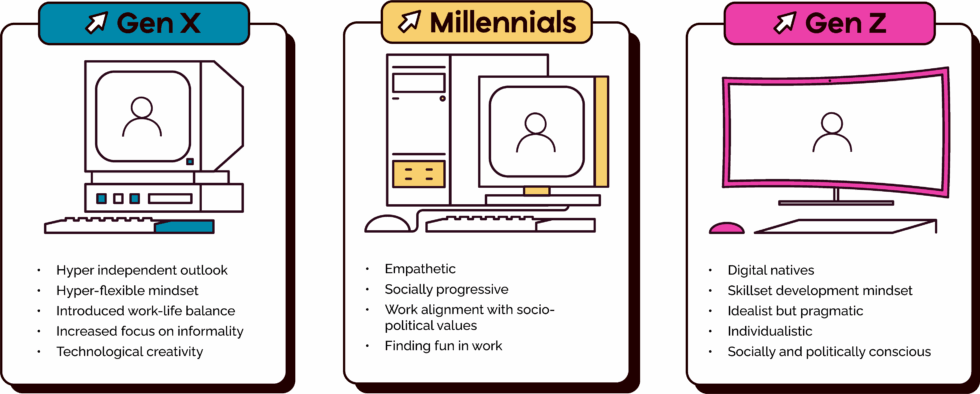Receive our newsletter
Keep up to date with the latest articles
Subscribe hereYou are using an outdated browser. Please update your browser for a better experience
Managing Gen Z employees has never been more important. They're projected to make up 74% of the workforce by 2030. So, it is imortant that we learn what their motivations and expectations are. As we know, culture shifts every day — as a result, so do the attitudes of our newly emerging generations.
To understand how to manage Gen Z, however, we’ve got to first understand who they are, what motivates them, and what characterises them.
Gen Z are those born after millennials, but before Gen Alpha, so between the late 90s — early 2010s. Their upbringing is characterised by exposure to the digital world and the internet — they’re the first generation to not know a world without it and are the world’s first real digital natives.
They were raised surrounded by uncertainty on environmental and political fronts, which they were constantly exposed to because of the quick-fire shift to a digital-first world. Subsequently, as a generation, they tend to be drawn towards purpose and accountability; pragmaticism; and personal development. Projected to make up 74% of the global workforce by 2030, it is important that companies know how to get the most from them.

They are are characterised by an explorative outlook. According to a study by Forbes, 80% of Gen Z respondents said that they’d prefer a job that allows them to explore and grow various skillsets, rather than one that’s focused on a particular set of skills. Managing Gen Z employees doesn't mean you shouldn’t set goals and targets for them — do, but don’t keep the rails up. Allow them to find their own way and make a role their own.
According to Deloitte’s latest survey, 70% of Gen Zs say that they’re developing skills to advance their careers once a week or more, compared to only 59% of millennials who say the same. For context, it’s important to remember that this generation is one that leans towards caution and practicality, so it only makes sense that Gen Z adults are keen to protect their futures and ensure opportunities remain available to them — they’re therefore, generally, keen advocates for skills development.
Job hopping has become a strategy for stability amongst many Gen Z and millenial employees. According to Deloitte, L&D is part of the top three reasons this generation chooses employers. Many, however, feel that managers are ‘missing the mark’ on key aspects of their development, which begs the question — are you listening to your team’s needs and giving them the space to grow? Managing Gen Z employees effectively means having conversations with them about their strengths, weaknesses, and opportunities to develop through the programmes you can offer.
Mocked for the rise of ‘snowflake culture’ in mainstream media for their outspoken attitudes, Gen Z is also marked by their activism. This doesn’t mean that they necessarily care about these issues more than the generations before them, but rather, it’s reflective of how they were raised — online. Gen Z have grown up hyper-exposed to the news, so it only makes sense that their expectation for fairness and representation in the workplace is more pronounced.
This generation doesn’t just want their organisation to uphold an inclusionary culture; they expect them to. In our own international barometer, it was revealed that 79% of employees said that attention to D&I would influence their choice of future employer. This is further demonstrates the increasing importance for companies to become inclusive spaces.
Career ambition looks different for Gen Z. They aren’t as fussed with promotions and financial incentives if they don’t see a focus being placed inwards, too.
But what does focusing inwards at work look like? For this generation, it means being given the space to develop skills that they can use to secure themselves future roles, as well as avoid burnout.
According to a study by Oxford Brookes, there are higher levels of burnout amongst this generation than any of those before them. So maybe their heightened focus on seeking a good work/life balance is actually just their subconscious response to protecting their own mental wellbeing. Many of them even believe that Managing Gen Z employees means taking on the role of a mentor — to support, inspire, and motivate them whilst also helping them set boundaries to maintain that work-life balance and help them overcome stress and anxiety.
So, when you think about managing Gen Z employees, don’t panic. Remember who they are and what characterises them. Of course, individuals will always vary, but generally, generational traits remain similar across the board — so, if you can open your mind up to the big picture traits that define them, you’re already half-way there. From there? Remember to listen, leave space, and above all, lead with empathy.
Interested in honing in your soft skills to lead with impact? Discover our Learning Collection portfolio.
Operation not possible, please try again later